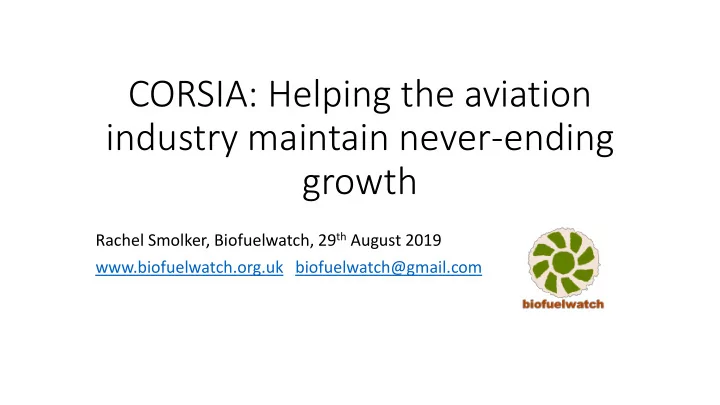

CORSIA: Helping the aviation industry maintain never-ending growth Rachel Smolker, Biofuelwatch, 29 th August 2019 www.biofuelwatch.org.uk biofuelwatch@gmail.com
The aviation industry’s dilemma: How to maintain it its steep emissions growth in in li light of f the Pari ris Agreement goals CO 2 emissions from aviation are estimated to use up 27% of the total carbon budget left if we want to have a chance of keeping warming to 1.5 degrees. That’s not counting the additional warming impacts which could be 2-4 times greater than those of CO 2 (IPCC).
Efficiency improvements cannot make up for emission increases fr from 5% annual growth The aviation industry can and should do far better on improving operational and flight efficiency… But it won’t be nearly enough to stabilise emissions at current growth rates… And the planet needs emissions to be rapidly phased out, not stabilised!
ICAO’s CORSIA scheme aims to solve the industry’s conundrum and protect it its growth rate ICAO – a specialist UN organisation – has been acting in the industry’s service. It Carbon Offsetting and Reduction Scheme for International Aviation (CORSIA) aims to ‘neutralise’ post - 2020 emission growth largely through biofuels and carbon offset credits. Source: German aviation industry federation (BDL)
CORSIA is set to become the bigg ggest ever carbon offsetting scheme Carbon offset schemes that have applied for CORSIA run projects such as these… Monoculture tree plantations by German company Global Woods. The Polish government – having The couple in the photo survived promoted the clearcutting of the serious violence and human rights ancient Białowieża Forest, wants abuses due to land grabbing for CORSIA credit for planting trees those plantations. and for cutting them down at a A cacia monoculture plantations in younger age. Roraima state, Amazon Region, Brazil
CORSIA endorses aviation biofuels fr from palm oil ICAO explicitly lists palm oil as an eligible feedstock for aviation biofuels under CORSIA. The greenhouse gas ‘default’ values expected to be approved by ICAO in September… • Classify palm oil from mills with methane capture as delivering >14% greenhouse gas savings; • Classify Palm Fatty Acid, a fraction of Crude Palm Oil, to deliver 77% greenhouse gas savings. An alternative methodology – not yet published – may allow airlines to claim EVEN GREATER ghg reductions from palm oil – and possibly ones from palm mills Eligible feedstocks, from CORSA FAQs without methane capture, too.
CORSIA figures bare no resemblance to the science. A study commissioned by the European Commission showed that palm oil biofuels are 3x worse for the climate than the fossil fuels they replace. Using the same methodology, Palm Fatty Acid Distillate has 224% more emissions than fossil fuel kerosene – not 77% less!
Why can we expect large-scale aviation biofuels to be made fr from palm oil? Aircraft cannot fly with ethanol or biodiesel in the tank. There are different technologies for making suitable aviation biofuels, but only one is commercially proven: Biofuels based on HVO refinery in Singapore by the world’s biggest HVO producer, Neste Oil, which uses mainly palm oil and palm Hydrotreated Vegetable Oil oil products
Palm oil is the most economic large-scale aviation biofuel feedstock Of all possible HVO feedstocks available in large supplies… • Palm oil is the cheapest; • Palm oil is the easiest to refine, requiring the least hydrogen (which brings down costs Deforestation for oil palm plantations in Central Kalimantan, further). Photo: Wetlands International
Neste is is start rting to ramp up avia iation bio iofuel production – based in in Sin ingapore, the heart of f the palm oil il in industry ry Other HVO producers are waiting in the wings… Since the EU has decided to slowly phase out most palm oil biofuels under its Renewable Energy Directive, they’re looking Total has just opened a huge HVO refinery using mainly palm oil in northern France. It’s about to for new markets . lose the tax rebate it relies on. Will CORSIA throw it a lifeline?
PFAD: Palm oil mis- labelled as ‘waste’ Palm-fatty acid distillate (PFAD) – which CORSIA claims offers high ghg reductions – is made from Crude Palm Oil. It is in high demand and never wasted. It would be possible to increase the fraction of PFAD compared to edible palm oil in response to demand. Classifying PFAD as very low carbon alone opens the door to large- scale aviation biofuels from palm oil!
Fossil fuel oil, too can be an ‘eligible’ ‘alternative aviation fuels under CORSIA Any fossil fuel kerosene that comes with 10% less ghg emissions than the average counts towards CORSIA ‘emissions reductions’, too. This might include oil from refineries powered with bioenergy – or simply oil from newer wells, which takes less energy to extract.
CORSIA cannot be reformed – it must be stopped! 1. ICAO is an entirely non-transparent, pro industry organisation. There are no credible mechanisms for civil society to reform CORSIA. 2. Even if some of the most shocking CORSIA proposals/rules were changed, it would remain a vehicle for facilitating unending aviation growth, making it all but impossible to avoid the very worst impacts of global warming. 3. We need to persuade member states – i.e. our governments – to reject CORSIA and implement policies to reverse the growth in aviation!
Recommend
More recommend